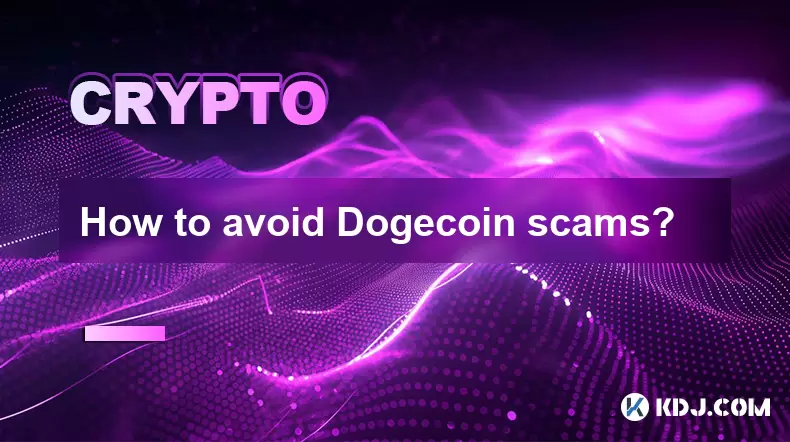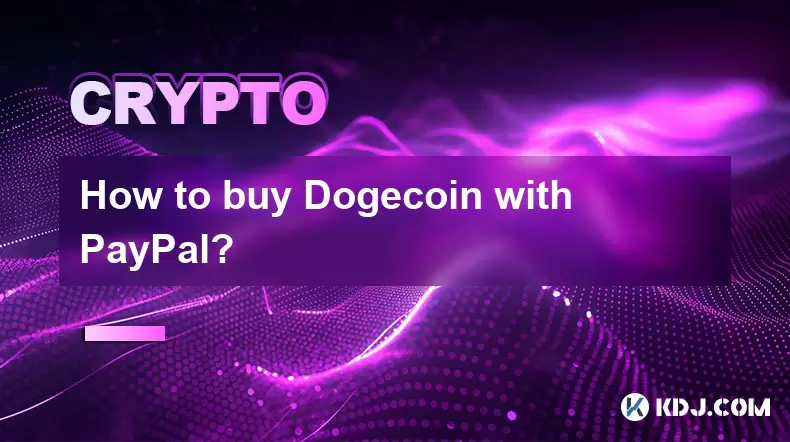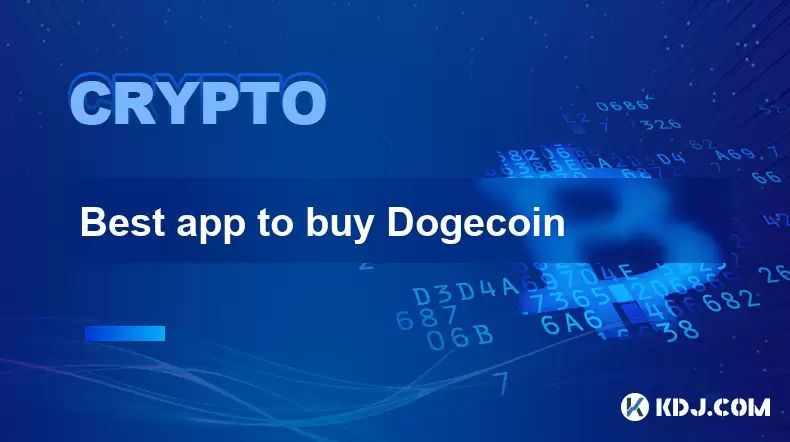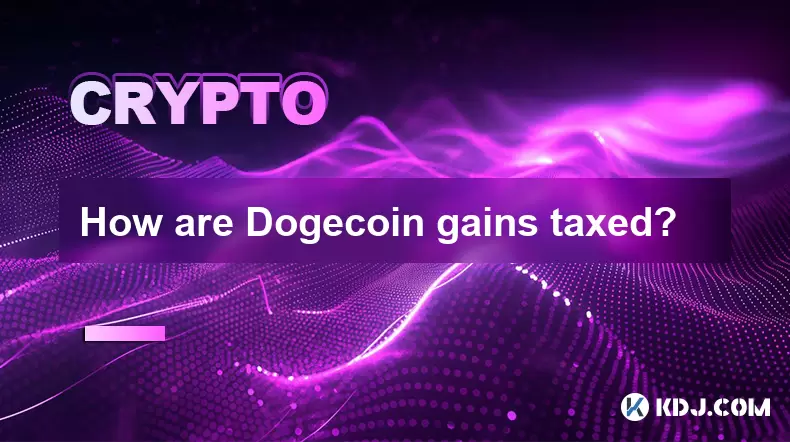-
 bitcoin
bitcoin $87959.907984 USD
1.34% -
 ethereum
ethereum $2920.497338 USD
3.04% -
 tether
tether $0.999775 USD
0.00% -
 xrp
xrp $2.237324 USD
8.12% -
 bnb
bnb $860.243768 USD
0.90% -
 solana
solana $138.089498 USD
5.43% -
 usd-coin
usd-coin $0.999807 USD
0.01% -
 tron
tron $0.272801 USD
-1.53% -
 dogecoin
dogecoin $0.150904 USD
2.96% -
 cardano
cardano $0.421635 USD
1.97% -
 hyperliquid
hyperliquid $32.152445 USD
2.23% -
 bitcoin-cash
bitcoin-cash $533.301069 USD
-1.94% -
 chainlink
chainlink $12.953417 USD
2.68% -
 unus-sed-leo
unus-sed-leo $9.535951 USD
0.73% -
 zcash
zcash $521.483386 USD
-2.87%
How to avoid Dogecoin scams?
Scammers often use fake Dogecoin giveaways, phishing sites, and Ponzi schemes to steal funds, so always verify sources and avoid sharing private keys or sending DOGE upfront.
Jul 04, 2025 at 07:00 pm

What Are the Common Types of Dogecoin Scams?
Dogecoin scams often appear in various deceptive forms, making it crucial for users to recognize them early. Fake giveaways are among the most prevalent, where scammers promise to multiply your DOGE if you send a small amount first. These schemes usually mimic real promotions from well-known figures or companies and use social media to spread quickly. Another common tactic is phishing websites, which imitate legitimate crypto platforms to steal login credentials or private keys. Ponzi schemes also target Dogecoin investors by offering unrealistic returns through referral systems or multi-level marketing structures. Additionally, malware attacks disguised as wallet apps or mining tools can compromise devices and drain digital assets. Recognizing these patterns helps users avoid falling victim.
How to Identify Fraudulent Dogecoin Giveaway Offers?
Identifying fake Dogecoin giveaways requires careful scrutiny of several key indicators. One red flag is an offer that demands a small initial payment to receive a significantly larger reward. Legitimate organizations do not ask users to send cryptocurrency before receiving rewards. Scammers often create urgency, pressuring victims to act quickly without verifying the source. Another warning sign is poor grammar or misspelled words in promotional messages or website content. Fake giveaways frequently use high-profile names like Elon Musk or major corporations without authorization. Always check official channels such as verified Twitter accounts, YouTube pages, or company websites before engaging. If an offer seems too good to be true, it likely is.
Why Should You Avoid Unverified Wallets and Exchanges?
Using unverified wallets or exchanges increases the risk of losing Dogecoin to malicious actors. Many fraudulent platforms resemble legitimate ones but lack proper security protocols or regulatory compliance. Always confirm whether a wallet or exchange is licensed and has positive user reviews. Some phishing sites use nearly identical URLs to popular services, tricking users into entering sensitive information. Others may promise high-speed transactions or reduced fees to lure victims. It’s essential to double-check the domain name and ensure HTTPS encryption is active. Trusted platforms like Binance, Kraken, and official Dogecoin wallets provide secure environments for managing DOGE. Never download software claiming to boost mining efficiency unless thoroughly verified.
How to Protect Private Keys and Recovery Phrases?
Protecting private keys and recovery phrases is fundamental to securing Dogecoin holdings. Never share these details with anyone, including individuals posing as customer support representatives. Scammers often pose as technical assistants on forums or social media, offering help in exchange for access codes. A best practice is to store recovery phrases offline in a secure location, such as a fireproof safe or encrypted USB drive. Avoid taking screenshots or saving them digitally unless using trusted hardware wallets. Some attackers use screen-sharing tools to capture this data during fake troubleshooting sessions. Enable two-factor authentication (2FA) wherever possible and consider using biometric verification for added security layers.
What Precautions Should Be Taken When Joining Dogecoin Communities?
Participating in Dogecoin communities can be informative, but it also exposes users to potential threats. Many groups on platforms like Telegram, Discord, or Reddit attract scammers who impersonate moderators or administrators. Verify the identity of channel owners before clicking on links or downloading attachments. Official communities typically have moderation teams that enforce strict rules against phishing and spamming. Be wary of unsolicited direct messages offering investment opportunities or exclusive airdrops. Legitimate projects rarely solicit funds privately. Always cross-reference announcements with verified sources and report suspicious activity immediately. Engaging only in reputable forums reduces exposure to malicious actors.
Frequently Asked Questions
How can I verify if a Dogecoin giveaway is real?
To verify a Dogecoin giveaway, start by checking the official website or verified social media profiles of the organization hosting the event. Look for announcements posted directly by recognized team members. Cross-reference news articles or community discussions on trusted forums. If the promotion involves sending DOGE first, it is almost certainly a scam.
Can antivirus software protect me from Dogecoin scams?
While antivirus programs can detect known malware strains used in crypto-related attacks, they cannot prevent all types of scams. Phishing attempts and fraudulent websites often bypass traditional security measures. It's important to combine antivirus protection with cautious browsing habits and strong password management.
Is it safe to invest in Dogecoin-based DeFi projects?
Investing in DeFi projects tied to Dogecoin carries risks due to the decentralized nature of these platforms. Many lack regulatory oversight, increasing the likelihood of fraud or smart contract vulnerabilities. Research each project thoroughly, read audit reports, and avoid platforms promising guaranteed returns or requiring upfront deposits.
How do I report a Dogecoin scam?
If you encounter a Dogecoin scam, report it to relevant authorities such as local cybercrime units or financial regulators. On social media, use platform reporting tools to flag fraudulent accounts. Notify affected crypto exchanges and warn others in community forums to prevent further damage.
Disclaimer:info@kdj.com
The information provided is not trading advice. kdj.com does not assume any responsibility for any investments made based on the information provided in this article. Cryptocurrencies are highly volatile and it is highly recommended that you invest with caution after thorough research!
If you believe that the content used on this website infringes your copyright, please contact us immediately (info@kdj.com) and we will delete it promptly.
- Super Bowl LX: Coin Toss Trends Point to Tails Despite Heads' Recent Surge
- 2026-01-31 07:30:02
- Aussie Prospector's Ancient Find: Japanese Relics Surface, Rewriting Gold Rush Lore
- 2026-01-31 07:20:01
- US Mint Adjusts Coin Prices: Clad Collector Sets See Significant Hikes Amidst Special Anniversary Releases
- 2026-01-31 07:20:01
- THORChain Ignites Fiery Debate with CoinGecko Over Bitcoin DEX Definitions: A Battle for True Decentralization
- 2026-01-31 07:15:01
- Fantasy Football Frenzy: Key Picks and Pointers for Premier League Round 24
- 2026-01-31 06:40:02
- Cryptocurrencies Brace for Potential Plunge in 2026 Amidst Market Volatility
- 2026-01-31 07:15:01
Related knowledge

Bitcoincoin burning mechanism
Jul 20,2025 at 09:21pm
What is the Dogecoin burning mechanism?The Dogecoin burning mechanism refers to the process of permanently removing DOGE tokens from circulation by se...

How to earn free Bitcoincoin?
Jul 19,2025 at 10:08pm
What is Dogecoin and Why Earn It?Dogecoin (DOGE) started as a meme-based cryptocurrency in 2013 but has grown into a widely recognized digital asset. ...

Is Coinbase a good wallet for Bitcoincoin?
Jul 19,2025 at 04:42pm
Understanding Coinbase as a Wallet Option for DogecoinWhen considering where to store Dogecoin, Coinbase is often mentioned as a potential option due ...

How to buy Bitcoincoin with PayPal?
Jul 23,2025 at 06:57am
Understanding the Basics of Buying DogecoinBefore diving into the process of buying Dogecoin with PayPal, it’s essential to understand what Dogecoin i...

Best app to buy Dogecoin
Jul 23,2025 at 03:08pm
What Is a Cryptocurrency Exchange and How Does It Work?A cryptocurrency exchange is a digital marketplace where users can buy, sell, or trade cryptocu...

How are Dogecoin gains taxed?
Jul 25,2025 at 07:01am
Understanding the Taxation of Dogecoin GainsWhen it comes to Dogecoin (DOGE), many investors are drawn to its meme-inspired branding and volatile pric...

Bitcoincoin burning mechanism
Jul 20,2025 at 09:21pm
What is the Dogecoin burning mechanism?The Dogecoin burning mechanism refers to the process of permanently removing DOGE tokens from circulation by se...

How to earn free Bitcoincoin?
Jul 19,2025 at 10:08pm
What is Dogecoin and Why Earn It?Dogecoin (DOGE) started as a meme-based cryptocurrency in 2013 but has grown into a widely recognized digital asset. ...

Is Coinbase a good wallet for Bitcoincoin?
Jul 19,2025 at 04:42pm
Understanding Coinbase as a Wallet Option for DogecoinWhen considering where to store Dogecoin, Coinbase is often mentioned as a potential option due ...

How to buy Bitcoincoin with PayPal?
Jul 23,2025 at 06:57am
Understanding the Basics of Buying DogecoinBefore diving into the process of buying Dogecoin with PayPal, it’s essential to understand what Dogecoin i...

Best app to buy Dogecoin
Jul 23,2025 at 03:08pm
What Is a Cryptocurrency Exchange and How Does It Work?A cryptocurrency exchange is a digital marketplace where users can buy, sell, or trade cryptocu...

How are Dogecoin gains taxed?
Jul 25,2025 at 07:01am
Understanding the Taxation of Dogecoin GainsWhen it comes to Dogecoin (DOGE), many investors are drawn to its meme-inspired branding and volatile pric...
See all articles










































































